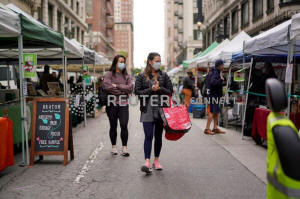Coronavirus seen knocking U.S. retail sales in March
 Send a link to a friend
Send a link to a friend
 [April 15, 2020] By
Lucia Mutikani [April 15, 2020] By
Lucia Mutikani
WASHINGTON (Reuters) - U.S. retail sales
likely suffered a record drop in March as mandatory business closures to
control the spread of the novel coronavirus outbreak depressed demand
for a range of goods, setting up consumer spending for its worst decline
in decades.
The report from the Commerce Department on Wednesday would come as
millions of Americans are thrown out of work, and strengthen economists'
conviction that the economy is in deep recession. States and local
governments have issued "stay-at-home" or "shelter-in-place" orders
affecting more than 90% of Americans to curb the spread of COVID-19, the
respiratory illness caused by the virus, and abruptly stopping the
country.
"The economy is almost in free fall," said Sung Won Sohn, a business
economics professor at Loyola Marymount University in Los Angeles. "We
will see the bottom when the coronavirus infection rates stabilize. It's
going to be a pretty deep bottom from which to come up."

According to a Reuters survey of economists, retail sales probably
plunged 8.0% last month, signalling the biggest decline since the
government started tracking the series in 1992. Retail sales fell 0.5%
in February.
Last month's anticipated drop in retail sales will reflect depressed
receipts at car dealerships, with light vehicle sales crashing in March.
With millions at home and crude oil prices collapsing amid worries of a
deep global recession, gasoline prices have dropped, which is expected
to have weighed on sales at service stations last month.
In addition, the closure of non-essential retailers probably knocked
sales at clothing, sporting goods and furniture stores.
Steep declines are also expected at restaurants and bars, which stopped
in-person service and moved to take-out and delivery service. Though
some businesses, including restaurants, have shifted to online sales,
economists say the volumes are insufficient to close the gap from social
distancing measures.
DIFFICULT MONTH
The drag on sales from social restrictions is expected to far outweigh
an anticipated surge in receipts at online retailers like Amazon <AMZN.O>,
and grocery stores and pharmacies as consumers stocked up on household
essentials such as food, toilet paper, cleaning supplies and medication.
[to top of second column] |

Shoppers wearing protective masks walk through the Historic Downtown
Farmers Market during the outbreak of the coronavirus disease
(COVID-19) in Los Angeles, California, U.S., April 5, 2020.
REUTERS/Kyle Grillot/File Photo

"March was likely a difficult month for retail sales as the country adjusted to
stay-at-home and social distancing policies related to COVID-19," said Ben
Ayers, a senior economist at Nationwide in Columbus, Ohio. "Many car dealerships
closed down operations altogether, while those that remained open have seen
fewer customers than normal despite on-line activity."
Excluding automobiles, gasoline, building materials and food services, retail
sales are forecast decreasing 2.0% in March, which would be the largest fall
since December 2018. These so-called core retail sales were unchanged in
February.
Core retail sales correspond most closely with the consumer spending component
of gross domestic product. With March's anticipated decrease, economists are
forecasting consumer spending plunging at an annualized rate of at least 5.0% in
the first quarter, which would be the weakest performance since the second
quarter of 1980.
Consumer spending accounts for more than two-thirds of U.S. economic activity.
It grew at a 1.8% pace in the fourth quarter, with the overall economy expanding
at a 2.1% rate over that period. Economists see no respite for consumer spending
in the second quarter, with estimates as low as a 41% rate of decline, despite a
historic $2.3 trillion fiscal package, which made provisions for cash payments
to some families and boosted unemployment benefit checks.
"In general consumer spending is going to look about as bad as it has ever been,
although there will be some categories of resilience," Tim Quinlan, a senior
economist at Wells Fargo Securities in Charlotte, North Carolina. "The panic
buying at grocery stores cannot offset the retrenchment in spending that we will
see in other categories."
Economists believe the economy entered recession in March. The National Bureau
of Economic Research, the private research institute regarded as the arbiter of
U.S. recessions, does not define a recession as two consecutive quarters of
decline in real gross domestic product, as is the rule of thumb in many
countries. Instead, it looks for a drop in activity, spread across the economy
and lasting more than a few months.
(Reporting by Lucia Mutikani; Editing by Chizu Nomiyama)
[© 2020 Thomson Reuters. All rights
reserved.] Copyright 2020 Reuters. All rights reserved. This material may not be published,
broadcast, rewritten or redistributed.
Thompson Reuters is solely responsible for this content. |